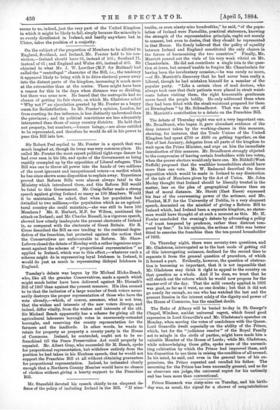On the subject of the proportion of Members to be
allotted to England, Scotland, and Ireland, Mr. Forster held to his con- viction,—Ireland should have 91, instead of 105; Scotland 71, instead of 61; and England and Wales 495, instead of 493. He objected to what Mr. J. W. Lowther (M.P. for Rutland) had called the " centrifugal " character of the Bill, i.e., the tendency it appeared likely to bring with it to drive electoral power away into the distant parts of the kingdom, increasing it much more at the extremities than at the centre. There might have been a reason for this in the days when distance was so dividing, but there was none now. He feared that the metropolis had no chance of getting its fair share, on which Mr. Gladstone asked "Why not ?" an ejaculation greeted by Mr. Forster as a happy omen for Redistribution. In Mr. Forster's opinion, London, far from exerting its due influence, is less distinctly understood than the provinces ; and its political convictions are less adequately interpreted than those of many country districts. He held that not property, but numbers,—human beings,—are alone entitled to be represented, and therefore he would do all in his power to pass this Bill into law.














































 Previous page
Previous page